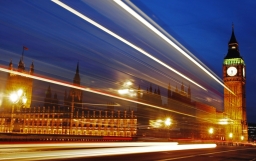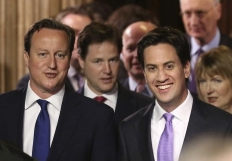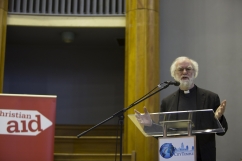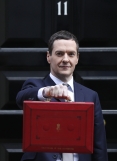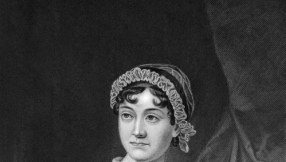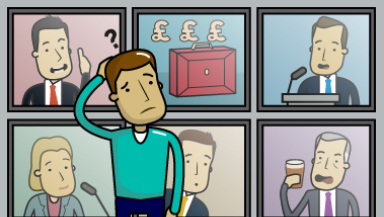
The General Election draws ever closer, the rhetoric is being ramped up and every day the House of Commons looks less like the Mother of Parliaments and more like a nursery where the staff have failed to control the kids' sugar intake. We're bombarded with facts and figures, claims and counter-claims, and at the same time Christian campaigners – like the Evangelical Alliance and Christians in Politics – encourage us to get out and vote. For anyone: just vote. But how do we decide whom to vote for?
Let's be honest: we're swayed not just by hard facts (which are difficult to come by) or even by the Bible (which doesn't tell us) but by habit, emotions and impressions. Rhetoric counts with us, just as it does with everyone else. But above all, Christians ought to be lovers of truth. As far as we can, we'll resist believing things that aren't true and we'll try to think clearly and Christianly about the big issues. Like: education, health, immigration, defence, aid, and economics – both how we make money and how we spend it.
Let's start with economics, then. Funny word, now I come to think of it.
It is Greek, from the word oikoumene, which means 'household'.
Makes you think a bit, doesn't it?
Yes. It isn't just numbers: it is about how a society lives together co-operatively and harmoniously in such a way that every member is included, valued and cared for.
I'm sorry, did you watch the Budget statement?
Yes, hence the comment about the sugar earlier. The trouble is that many MPs really do have deep convictions about how these worthy goals can be accomplished, and a correspondingly deep commitment to making sure the other side don't mess things up. These things don't always look good on TV.
The Coalition put the blame for everything bad on Labour, and seemed to be pretty bullish. Is that fair?
In absolute terms, no – though there is much to be said on both sides. The recession began in 2008 and was the result of banks in the US and UK suddenly realising that they had no money – they had lent to too many dodgy customers and failed to keep enough capital in reserve to cover bad debts. They, and other financial institutions, developed hugely complicated financial packages called 'collateralised debt obligations' – debts that were parcelled up and sold as if they had some intrinsic value, then repackaged and resold. It was a house of cards: if the person or company that owed the money in the first place couldn't pay, everything collapsed. In his illuminating book on the crisis, How Do We Fix This Mess, Robert Peston describes them as "technology to turn tainted meat into gourmet sausages, or ordure into gold". In hindsight, it all looks inevitable, but in fact neither George Osborne in opposition nor Gordon Brown when he was chancellor saw it coming.
But the Coalition had a bit of a mess to sweep up, didn't it?
Yes. But it is not fair to accuse Gordon Brown and the Labour government of particular incompetence. Before the banking crisis public debt was £742 billion, equivalent to 52 per cent of GDP; high but not unsustainable. The Labour government then had to inject vast sums into the rescue of Royal Bank of Scotland and Lloyds Banking Group, tripling this figure; but the consequences of not doing so would have been incalculable, and any government would have had to do so. Gordon Brown was widely praised for his handling of the crisis. Take out the figure for the bank rescue and the debt at the end of 2010, when the Coalition took office, was only 59 per cent of GDP or £889 billion.
And now?
The equivalent figure is around £1,480 billion – 80.4 per cent of GDP.
But I thought the Chancellor had been getting the deficit down.
The deficit is not the same as the national debt, which has continued to rise. The chancellor has been trying to reduce the amount the government has to borrow each year. At the moment it borrows more than it earns – imagine an overdraft creeping inexorably upwards as your salary never quite keeps up with your expenses. There will come a point – towards the end of the next parliament, if all goes well – when the country earns more in tax than it borrows, and the budget will be in surplus. Only then will the debt (which will be a lot higher then) actually begin to fall.
So what's the argument actually about?
It's between people like the chancellor, who has argued for sharp cuts to austerity in an effort to get the country to live within its means, and the shadow chancellor, Ed Balls, who has argued for less sharp cuts and less austerity. It is fair to say that this is not just about economics in the narrow sense: the Right is ideologically in favour of a small state with limited public funding for services, while the Left is in favour of a larger state with much more input from central government.
Mr Osborne seemed quite pleased with himself on Wednesday.
He can certainly point to some considerable successes. More people are in work than ever before and the economy is growing – ie tax receipts are rising. We are doing much better than our European competitors.
That's a result, surely.
Indeed, and all credit to him: some people forecast economic Armageddon when the scale of the cuts was known, with large numbers out of work, businesses collapsing and widespread social unrest. However, Mr Balls can also legitimately say that this has been the longest recession in living memory. He can point out that most of the jobs that have been created have been low-wage, which brings its own problems for the exchequer as low-waged families in work become eligible for tax credits, becoming – at least in immediate financial terms – a cost to the public finances rather than a benefit. (On the other hand, worklessness is also a huge cost because of the mental and physical harm it does to people without jobs, and which is paid for by the NHS and social services.)
Mr Balls argues that if the cuts had been rather less and investment rather more, tax receipts would actually be higher, the economy would be larger and we would be closer to running a budget surplus.
But which of them is right?
Most of the world would like to know that. But this is not about who is right; it's just about helping us think these things through. Both Right and Left had a huge problem to deal with and both saw the need for cuts. The argument is about how deep the cuts should have been.
However, it's not just about the past. Mr Osborne is determined to not just to get rid of the deficit, but to shrink the debt – a much harder thing. So if the Conservatives are elected and form a government without the Liberal Democrats, there will be more and deeper cuts. Among them is a £12 billion reduction in spending on welfare, a category that includes disability living allowance, housing benefit, the carer's allowance and a lot more. It is not clear yet where that axe will fall, or what else might suffer – education or defence, for instance. But the argument is that a pretty dark few years will lead to a brighter future: a smaller debt means lower repayments and a richer country before too long. Mr Balls argues that exactly the same result, taking a little longer, could be achieved through borrowing and taxing more; services would need not suffer to such and extent and less damage will be done.
Do I have to have a degree in economics to have an opinion about this?
It wouldn't help you, because even economists can look at the same data and come to different conclusions. What matters is that you don't just listen to whichever voice is loudest and that you know that neither side is stupid. And while economics is very, very important – if you don't have money you can't do the other stuff – it's only one thing that shapes how we vote.
So there'll be more of these?
You can count on it.










